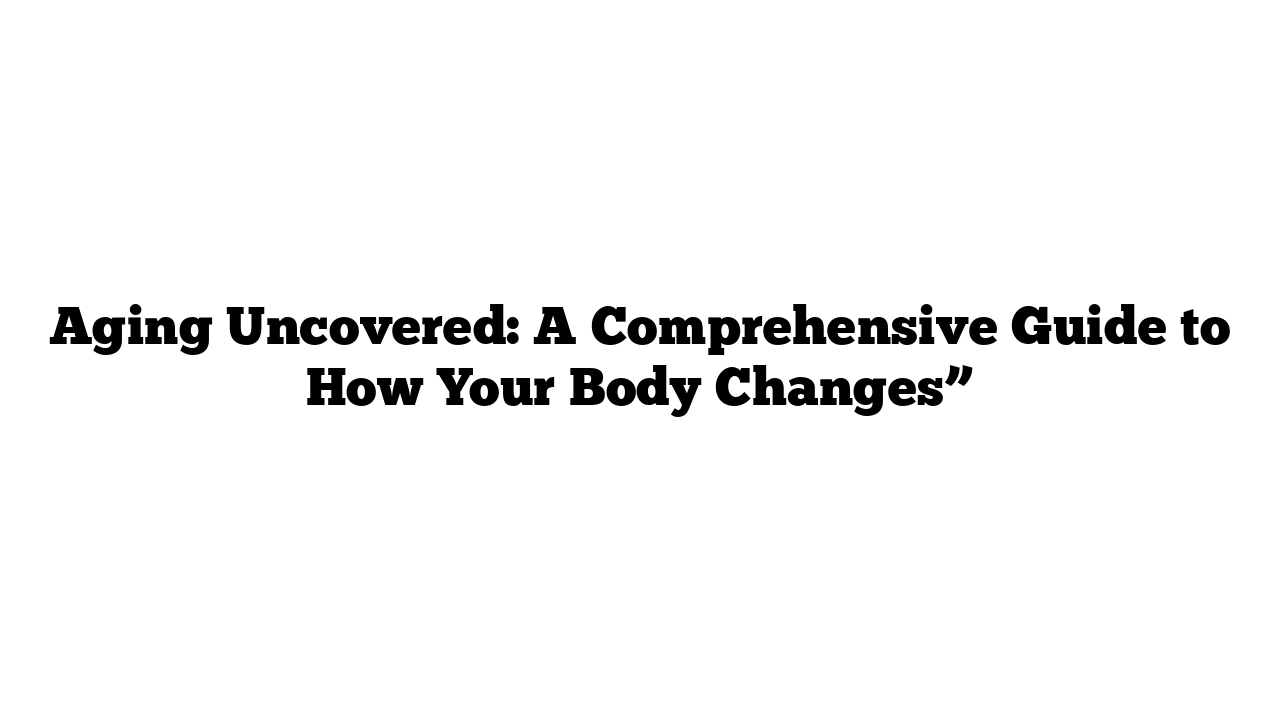“The Journey of Aging: How Your Body Changes Over Time”
As we journey through life, our bodies experience a gradual decline, especially when we reach our 70s and 80s. By the time we hit our 40s and 50s, many of us start facing health challenges. Let’s explore how different organs and body parts age and what we can do about it.
The Brain: A Gradual Decline
Our brains are vital, but they undergo significant changes as we age. Brain atrophy is a common issue; it loses about 5% of its volume per decade starting in our 30s. This decline results from cell loss and degeneration of nerve pathways. Vascular problems can accelerate brain atrophy, making it crucial to monitor your vascular health. Conditions like Alzheimer’s disease may arise, although the causes are often unclear.
Ears: The Sounds of Aging
Many might think they have two ears, but technically, we have six: three on each side—outer, middle, and inner. Aging affects all of them:
- Outer Ear: Cartilage and tissues can droop over time, leading to changes in appearance.
- Middle Ear: Tiny bones may suffer from arthritis, causing age-related hearing loss known as presbycusis.
- Inner Ear: Specialized hair cells that send signals to the brain can die off, leading to sensorineural hearing loss. High-frequency sounds become difficult to hear, often starting around age 30.
Eyes: The Window to Our Health
Aging brings presbyopia, the difficulty in focusing on nearby objects. Our eyes, primarily fluid-filled sacs, can also experience changes in fluid dynamics, potentially leading to glaucoma. The vitreous humor may harden and cause floaters, which, while usually harmless, should be checked by a doctor.
Nose: The Sense of Smell
The aging process diminishes our olfactory nerve’s effectiveness. With a decrease in mucus production, our ability to catch odors declines, which can alter our taste. This can lead to increased salt consumption, which is detrimental to our vascular health. A diminished sense of smell can also lead to loneliness and depression as social dining experiences decrease.
Skin: The Body’s Largest Organ
Our skin, the largest organ, starts to sag due to a reduction in collagen and elastin, the proteins responsible for skin structure. This sagging can affect facial expressions, sometimes leading to the appearance of sadness or anger, which can send negative social signals. To combat skin aging, it’s essential to moisturize and protect it from sun damage.
Hair: The Changing Colors
Starting in our late 30s, hair follicles thin out and may turn gray as melanin production decreases. Male pattern baldness may occur, while excess hair growth can appear in other areas, sometimes referred to as the Androgen Paradox. Maintaining hair health is possible but be cautious with harsh chemicals.
Teeth: Keeping Your Smile
In our mouths, salivary glands that protect against bacteria gradually produce less saliva as we age. This can lead to gum recession and enamel loss, making regular dental check-ups vital to maintaining oral health. Poor dental health can even result in infections affecting other areas, such as the sinuses.
Larynx: Changes in Our Voice
The larynx can also age, with thinner muscles and vocal folds leading to a condition known as presbyphonia. Changes in voice can signal aging, affecting communication and social interactions.
Heart: The Powerhouse of Life
As we age into our 50s and 60s, our heart muscles may lose oxygen due to narrowing arteries. The heart has limited collateral blood flow, making it vulnerable to damage if blood supply is compromised. Our ancestors had shorter lifespans, so our cardiovascular systems are not equipped for extended longevity.
Uterus: Changes in Female Health
For women, aging brings hormonal shifts after childbearing years. The risk of ovarian cancer can increase, making regular check-ups essential for monitoring reproductive health.
Prostate: Men’s Health Concerns
The prostate can enlarge with age, leading to urinary difficulties as it compresses the urethra. Many men experience increased nighttime urination due to this issue, emphasizing the importance of prostate health.
Joints: Wear and Tear
Joints can begin to deteriorate in our 30s and 40s, especially if they’ve been stressed from activities like running on hard surfaces. Proper care, such as low-impact exercises like swimming or running on grass, can help maintain joint health.
Feet: The Foundation of Mobility
Our feet often go unnoticed but are crucial for mobility. Aging can lead to circulation issues in the extremities, increasing the risk of falls. Maintaining good foot health is essential for overall wellness.
Embracing Change
Aging is inevitable, but we don’t have to face it defenseless. Recognizing these changes allows us to take proactive steps to maintain our health. Wisdom often comes with age, and while our bodies may age, the joy of life’s experiences, like the love of family, becomes invaluable.
